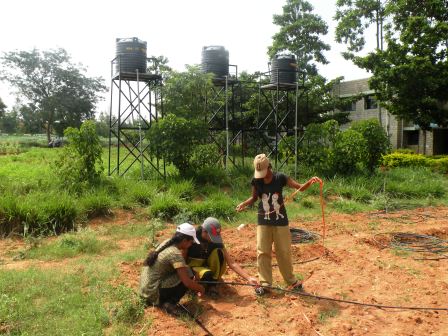
Project Summary
Based on pioneering research done by the University of Agricultural Sciences, (UAS) Bangalore, it was established that human urine can be productively utilised in agriculture and can produce on par yields with chemical fertilizers. Resource substitution of the petroleum based and energy and water intensive artificial fertilizers is possible. With a view to continue these studies and to understand the long term impact of the application of human urine on soil and crops, the recovery of nutrients from human waste streams, Arghyam is supporting this research for the institutionalization of urine application research and research on closing of nutrient loop using humanure. The key objectives of Phase II are:
- The continuation of the research work on human urine as a liquid fertilizer, followed by (a) experiments in farmer’s fields at H.D. Kote taluk and (b) conduct field experiments to study the effect of bio char enriched with urine on soil properties, growth and yield of crops.
- Arghyam‘s NGO partner, MYKAPS will work in H.D. Kote and Kamasamudram to ensure use of urine from Ecosan Toilets through drip/surface irrigation.
- Demonstration on growing 3 or 4 vegetables crops using human urine applied through drip system under green house conditions at GKVK
- Developing protocol on use of composted humanure to localize and contextualize handling, transportation, composting and application of humanure.
- Conducting workshops on preparation of Jeevamrutha and panchagavya using humanure and its use for growing crops organically
- Developing communication workshops on preparation of Jeevamrutha and panchagavya using humanure and its use for growing crops organically.
- Arranging a workshop for Arghyam partners, other agriculture universities for dissemination of technology.
- Developing advocacy plan and help UAS advocate the research.
Outputs
- Scientific data on safe handling of anthropogenic liquid waste, converting this to enriched manure (using bio-char) and application of urine to field crops and vegetables in farm lands.
- Guidelines for the safe use of waste-water, excreta and grey water.
- Publication of scientific research in journals.
- Knowledge sharing among farmers, Agricultural Universities- Researchers, Government agencies such as Agricultural Department, State Pollution Control Board, Water Supply and Sewage Board and NGOs.
- Demonstration plots at GKVK showing the results of this research.
*Grant amount & beneficiary figures are as per actuals for completed projects.







 University of Agricultural Sciences (UAS) Bangalore
University of Agricultural Sciences (UAS) Bangalore